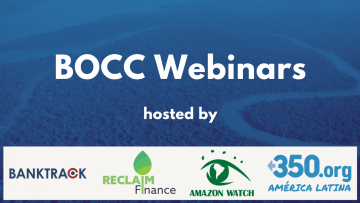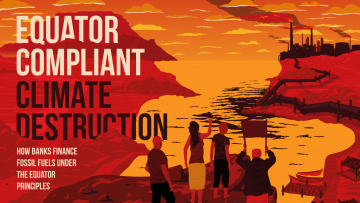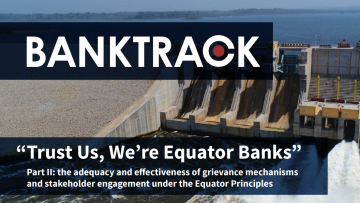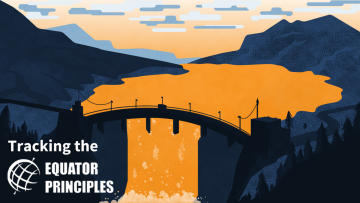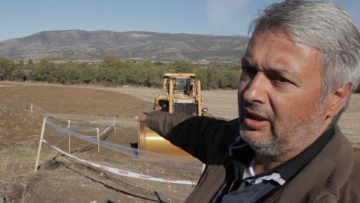
Project – On record
This profile is no longer actively maintained, with the information now possibly out of date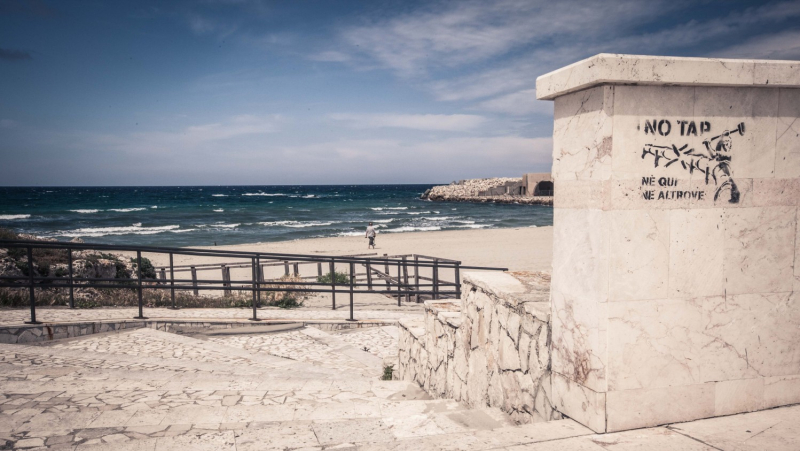
Project – On record
This profile is no longer actively maintained, with the information now possibly out of dateWhat must happen
As a result of its harmful environmental, social and climate impacts, further construction and realisation of the TAP project would be a major setback both for the communities affected by the project and Europe’s energy future, bearing in mind the resulting 'carbon lock-in' which the project would bring about. The wide range of impacts put the project's viability at risk. Financial institutions should be aware of all the rights violations and technical shortcomings on the ground in Albania, Greece and Italy – a Counter Balance and BankTrack analysis (published in February 2017) describes how the project is failing to comply with the Equator Principles.
Although financial close has been completed, various problematic aspects of the project remain unresolved, including ongoing legal investigations and processes in Italy concerning alleged environmental violations. All potential financiers – both public development banks and commercial banks – should put on hold the disbursement of financing to the promoters of TAP until these problematic aspects are duly resolved.
| Take Action! |
| NO-TAP Movement |
| Sectors | Pipeline Transportation of Natural Gas , Oil and Gas Extraction |
| Location |
|
| Status |
Planning
Design
Agreement
Construction
Operation
Closure
Decommission
|
| Website | http://www.tap-ag.com |
|
|
This project has been identified as an Equator Project |
The Trans Adriatic Pipeline (TAP) project is the western extension of the Southern Gas Corridor (SGC). SGC is planned to export natural gas – initially 10 billion cubic metres per year – from the Shah Deniz II field in the Caspian Sea to western markets via the South Caucasus Pipeline extension (Azerbaijan to Georgia), on through the Trans-Anatolian pipeline (TANAP) stretching across Turkey, and then joining up with TAP at the border of Turkey and Greece. With estimated construction costs of EUR 5 billion, TAP is planned to run for 879 kilometres in total across northern Greece (545 km), Albania (215 km), the Adriatic Sea (105 km), make landfall in Italy at a small, popular beach in San Foca, and conclude with a short pipeline section (8 km). A further 55 km pipeline is planned to connect TAP to the Italian gas network. The TAP company is promoting and constructing the project; its current shareholding comprises BP (20%), SOCAR (20%), Snam (20%), Fluxys (19%), Enagás (16%) and Axpo (5%).
Impact on human rights and communities
TAP's shortcomings in the pre-construction phase and now the construction phase are being resisted by a variety of communities, groups and local authorities. In Albania uncertainty and confusion has been created for many people whose lives, land and livelihoods are being jeopardised. Villages along the TAP route are dotted with scores of olive trees, orchards, pastures and fields providing subsistence for local inhabitants. Two fact-finding missions carried out in 2016 by NGOs (July: 32 villages visited; August: 30+ villages visited) identified extensive community discontent concerning involuntary resettlement, compensation for loss of land and property, damage to property and the engagement methods being used by TAP’s Albanian contractor ABKons.
In Greece, as the pipeline routing is planned to cross highly fertile agricultural land in the north-east, farmers' groups have borne the brunt of what they say have been inappropriate consultation methods deployed by TAP, with instances of threats and malfeasance connected with land acquisition dating back to 2015 and still ongoing. Approximately 200 farmers are unwilling to settle terms with the company, and stand-offs between the company and farmers have resulted in police interventions, with farmers confronting TAP workers who have arrived on their land without permits or consent.
In Italy, around two hundred families, local fisheries and a burgeoning local tourism sector are directly affected by the project proposal. Trust between TAP AG and much of the affected community in Melendugno, as well as other stakeholders (i.e., local and regional authorities), has broken down – the company's efforts to start construction for the final leg of the project in Italy are currently stalled owing to local opposition and ongoing court cases.
The European Investment Bank (EIB), a financier of TAP, is conducting due diligence. Reflecting the level of public grievance over TAP, the EIB has already received 13 complaints about TAP from members of the public and groups in the three transit countries.
Impact on climate
Fossil gas has been touted as a “transition” fuel that will help world governments move towards fully renewable energy. Yet scientists question how clean the fuel really is, pointing towards high leakage rates across natural gas’s production, transportation, and storage. Moreover, fossil gas used in heating in transportation has been shown to have a greater greenhouse gas footprint than oil. Keeping global temperature rises below 2° Celsius requires full decarbonization - a goal jeopardised by the construction of new natural gas pipelines.
Rather than reduce emissions, as required by the Paris accords, the pipeline will create a long-term dependency on fossil fuels. Proponents of TAP are clinging onto an unsustainable resource.
Impact on nature and environment
Individual environmental and social impact assessments (ESIAs) were prepared for each of the three TAP transit countries. In Albania, the ESIA was approved by the Ministry of Environment, Forests and Water Administration in April 2013, followed by official granting of the Environmental Permit.
In Greece, the Ministry of Environment, Energy and Climate Change formally approved the TAP ESIA in September 2014, though legal challenges (ongoing) to the approval have been lodged at Greece's Supreme Court. At issue is the routing of the pipeline section Kavala-Serres-Thessaloniki, 113 kilometres in length, which would disrupt fertile agricultural land and present threats to various villages, and the location of a compressor station close to a number of villages and settlements. Major concerns relate to the pipeline's integrity in the acutely flood-prone region of Tenagi in Kavala, and TAP AG's unwillingness to consider suggested alternative locations for its compressor station in the seismic Serres plain.
In Italy, the ESIA approval process has been – and remains – highly contested. In September 2014, Italy's Environment ministry approved the TAP ESIA, yet in so doing also attached 58 mandatory provisions for TAP to fulfil before the beginning of the project's construction. TAP AG is understood to have so far provided documentation which allows it to fulfil only three of these mandatory provisions and – alarmingly – is said to be seeking final authorisation to proceed with construction on the basis of fulfilling the missing provisions only during its implementation of the project. The company's plans to transplant sensitive olive trees continue to be disputed and TAP opponents contend that the mitigation of environmental impacts from drilling work (offshore and onshore) remains uncertain owing to missing assessments on impacts to the seabed and independent studies on species impact.
In December 2018 the project reached financial close, securing EUR 3.9 billion in project finance as follows:
- European Investment Bank: EUR 700 million
- European Bank for Reconstruction and Development: EUR 500 million (A-loan)
- European Bank for Reconstruction and Development: EUR 500 million funded by commercial banks (B-loan)
- Export Credit Agencies:
- Bpifrance Facility: EUR 450 million
- Euler Hermes Facility: EUR 280 million
- SACE Facility: EUR 700 million
- Commercial term loan: EUR 635 million directly provided by commercial banks without any ECA or multilateral involvement.
See below for the financial institutions involved.
Project sponsor
Trans Adriatic Pipeline (TAP) AG
- international -Other companies
Axpo Holding
SwitzerlandBP
United KingdomEnagás
SpainFluxys
BelgiumSnam
ItalySOCAR
Azerbaijan2020
2020-12-31 00:00:00 | Trans Adriatic Pipeline begins gas deliveries from Azerbaijan to Italy
The Trans Adriatic Pipeline began delivering first gas from Azerbaijan to Italy on Dec. 30, with 3 million cu m of technical gas supplied into the line that day, according to data from Italy's transmission system operator Snam, adding that nominations are set to rise to 10 million cu m for Dec. 31. In its current form, TAP is set to deliver 8 Bcm/year of gas into Italy, 1 Bcm/year to Greece and 1 Bcm/year to Bulgaria.
2020-09-10 00:00:00 | Trials start in Italy over controversial Trans Adriatic Pipeline
On Friday 11th September two trials started in Italy concerning, on the one hand, the local opponents to the controversial Trans Adriatic Pipeline (TAP) and, on the other hand, the company promoting the project. In one of the trials, TAP AG together with its managers in charge of the construction of the pipeline will be accused of causing environmental disasters. In the other trial, 92 people who have peacefully resisted the construction of the pipeline, if found guilty, could have to pay fines of up to EUR 240,000 and legal fees of up to EUR 70,000.
2020-06-10 00:00:00 | TAP completes offshore section
TAP AG has successfully completed the 105km long offshore section of the pipeline across the Adriatic Sea. This milestone includes several deliverables, such as the offshore installation of 36-inch pipes by Castoro Sei, Saipem’s semi-submersible pipelaying vessel, the above-water-tie-in with the onshore infrastructure in Albanian waters, as well as hydrotesting the asset to ensure it is safe and ready for operations.
2020-05-25 00:00:00 | TAP begins testing process
TAP has begun to import natural gas in the last section of the pipeline in Greece, in the 4km section between the Greek-Albanian border, and up to the TAP metering station in Bilisht, Albania. This is part of the test operation of the project. The test operation process inspects the safety of the infrastructure according to national and international standards. Following the commission of the first section, gas will continue to be introduced into other pipeline sections in Albania and beyond in the coming weeks and months.
2020-05-14 00:00:00 | TAP project over 95% completed
As of April 2020, the Trans Adriatic Pipeline (TAP) was 95.1% completed, according to the TAP AG Consortium.
“TAP is currently moving further into the project construction phase. Every day hundreds of meters of TAP’s Right of Way (ROW) are cleared, strung, welded, lowered into the trenches and backfilled, in line with the project construction steps and schedule. At the end of April 2020, the TAP project was 95.1 percent completed,” said the consortium.
2020-03-16 00:00:00 | TAP to start filling Albanian and Italian sections with gas soon
The first gas will be introduced into the Albanian and Italian sections of the Trans Adriatic Pipeline (TAP) in the coming weeks. The TAP Head of External Affairs noted that the commissioning phase is due to be completed in time for TAP to transport first gas in 2020.
2019
2019-01-11 00:00:00 | Trans Adriatic Pipeline project reaches financial closure
In December 2018 the Trans Adriatic Pipeline project reached financial closure, securing EUR 3.9 billion in project finance. The financing is provided by a group of 17 commercial banks, alongside the EBRD and the European Investment Bank (EIB). Part of the financing is covered by the export credit agencies - bpifrance, Euler Hermes and Sace (EIB press release).
2017
2017-08-16 00:00:00 | More clashes and continuing tension over olive trees in Puglia, Italy
On July 4 this year, between 1am and 7am, approximately 400 police moved in to block every road in and out of the small tourist town of Melendugno in Puglia – this was done to enable TAP contractors to move 47 uprooted olive trees.
Local villagers who have been resisting TAP’s uprooting of ancient olive trees to make way for the pipeline route experienced what they say was the most heavy-handed police violence since the beginning of their resistance efforts in March this year – Melendugno’s vice-mayor was among those physically beaten by police. An authorisation document signed by the TAP company included a commitment not to carry out TAP-related work during the tourism season and until the end of September. A short video clip containing testimonies about what took place on the night of July 4, including from the deputy mayor of Melendgno Simone Dima, is available here.
This is a further example of the company’s bad faith in Italy as it brazenly attempts to stick to its schedule, and it has provoked yet further tensions with the local community, who are now anticipating an escalation of police involvement in late September. Four more formal complaints – in addition to those noted already in the Counter Balance and BankTrack analysis published in February – have been lodged about the implementation of the TAP project at the European Investment Bank by complainants in Italy.
2017-08-16 00:00:00 | Major Italian media investigation reveals TAP linkages to politically exposed persons and offshore vehicles
An investigation published on 20 April 2017 by L’Espresso, Italy’s top weekly publication, uncovered the web of companies and shareholders linked to both the TAP and TANAP projects.
‘The pipeline of the three regimes’ investigation uncovered a web of connections to the regimes of President Erdogan in Turkey and of President Aliyev in Azerbaijan, including via family members and politically exposed persons. The investigation – available here in English translation – also establishes connections to offshore vehicles that were first identified as part of the Panama Papers.
Civil society organisations have brought these matters to the attention of the European Investment Bank. Private banks which may be considering involvement in TAP are advised, in this murky context, to carry out reinforced due diligence ahead of any decision on TAP financing – in order to avoid supporting a project whose real beneficiaries may be politically exposed persons directly linked to autocratic regimes and companies registered in offshore jurisdictions.
2017-08-16 00:00:00 | Tensions increasing in Greece, where residents’ demands are going unheard
In Greece, the Farmers’ Association in Kavala filed a complaint to the European Investment Bank in August 2015 – to date this complaint has not been heard. EIB staff visited Kavala in October 2016, however they failed to address the issues in question which had been raised by the Farmers’Association nor did they facilitate any kind of solution with the Greek government and the TAP consortium.
Currently there is 10 kilometres of land where construction is blocked because the land owners have not been informed or consulted during the environmental impact assessment or at any stage thereafter, and have pressed charges against the company for violation of private property and damage. In the Greek context of economic and financial crisis, where agriculture remains one of the very few sectors which allows people to earn a living, the farmers’ demands are more than reasonable and should be heard. Moreover, the range of security and health issues which have been raised by many other voices opposing the project, as well as the project’s economic underpinnings (the Greek state could be asked to provide a public guarantee for any public or private loans agreed for TAP) are an extra concern in Greece. In July, a further issue concerning the TAP project’s use of water has emerged, in the context of the water crisis which Greek agriculture is currently facing.
2017-08-16 00:00:00 | Oil price and Russian pressure put Azerbaijan’s strategic gas project at risk – Chatham House
A recent assessment (19 July 2017) from an associate of The Royal Institute of International Affairs/Chatham House in London points to the “faltering finances” of the Southern Gas Corridor as a whole and questions the financial credibility of the Corridor’s component parts (TAP and TANAP) given the acute economic downturn currently being experienced by Azerbaijan.

